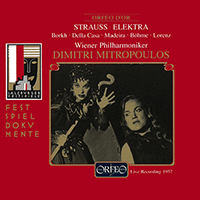Marilyn Horne
Marilyn Horne’s father, a keen amateur singer, was her first teacher. She first sang in public while still a small child and after moving with her family at the age of eleven to Long Beach, California she studied with Edna Luce, to whom she attributes her extraordinary breathing technique and the foundation of her excellence as a bel canto singer. Following completion of studies at Long Beach Polytechnic, Horne won a scholarship to the University of Southern California. Here she studied voice with William Vennard, song and recital works with Gwendolyn Koldofsky (her accompanist thereafter for ten years) and participated in master-classes with Lotte Lehmann in Santa Barbara and Pasadena.
With the Roger Wagner Chorale Horne toured Europe in 1953 and the following year made her operatic debut as Háta / The Bartered Bride with the Los Angeles Opera Guild. She also attracted widespread fame as the voice of Dorothy Dandridge in Otto Preminger’s film, Carmen Jones. Following the death of her father, in 1956 Horne travelled to Europe to further her career and achieved a rapid breakthrough when Stravinsky invited her to sing at that year’s Venice Festival. She joined the opera company of Gelsenkirchen in 1957, remaining there until 1960; here her repertoire included roles such as Giulietta / Les Contes d’Hoffmann, Mimì / La Bohème, Amelia / Simon Boccanegra and Tatyana / Eugene Onegin. During this time Horne also appeared as a guest in Vienna, singing one of the servants in Richard Strauss’s Elektra at the 1957 Salzburg Festival (she later returned as Amneris / Aida from 1979 onwards). Her performance as Marie / Wozzeck (a role she had not wished to play) at the inauguration of Gelsenkirchen’s new opera house during May 1960 having achieved widespread critical acclaim, Horne returned to the USA that year to sing the same role with great success at the San Francisco Opera, following the illness of the scheduled singer, Brenda Lewis. During the following year, she created the role of Laura in the premiere of Vittorio Giannini’s opera The Harvest in Chicago.
Also in 1961 Horne sang for the first time with Joan Sutherland (in a concert performance of Beatrice di Tenda in New York). This was the start of an enduring and extraordinarily fruitful partnership, both in the opera house and on record. As her fame spread, so Horne’s international career grew: she made her debut at the Royal Opera House, London in October 1964 as Marie, returning in 1967 and 1970 to sing Adalgisa to Sutherland’s Norma. Later Covent Garden roles included Malcolm / La donna del lago (1985), Arsace / Semiramide (1986) and Isabella / L’italiana in Algeri (1989 and 1993). Horne’s debut at La Scala, Milan took place in 1969 as Jocasta / Oedipus Rex, followed shortly afterwards by a sensational performance in Rossini’s L’assedio di Corinto. Her first appearance at the Metropolitan Opera, New York was in 1970, once again opposite Sutherland in Norma. She returned to the Met regularly until 1996, her roles there including Rosina / Il barbiere di Siviglia, Gluck’s Orfeo, Isabella, Amneris, Fidès / Le Prophète, Eboli / Don Carlo, Dalila / Samson et Dalila, Arsace, Samira / The Ghosts of Versailles, Mistress Quickly / Falstaff, Geneviève / Pelléas et Mélisande and the title roles of Carmen and Rinaldo. Horne was also active elsewhere in the USA, singing often at Houston, San Francisco (Calbo / Maometto II, 1988) and Santa Fe.
In Europe Horne appeared in Paris in Vivaldi’s Orlando furioso (1981) and at the Teatro Fenice, Venice as Rinaldo (1989). Having been awarded the title of ‘greatest Rossini singer in the world’ by the Rossini Foundation in 1982, she sang Falliero / Bianca e Falliero and the title role of Ermione at the Rossini Festival, Pesaro in 1986 and 1987 respectively.
As her operatic career gradually drew to a close, in 1993 Horne established The Marilyn Horne Foundation to develop the song recital throughout the USA and to benefit young singers; this organisation was absorbed by Carnegie Hall in 2010. She retired from the concert stage in 1999 with a recital at Chicago’s Symphony Hall, but continued to perform occasionally at concerts of popular music. Horne also taught extensively and continued to be active despite a diagnosis of pancreatic cancer in 2005. She married the conductor Henry Lewis in 1960 but they divorced in 1974; her second husband was the Greek bass Nicola Zaccaria (1923–2007).
Horne possessed a rich voice with a unique timbre that was memorable equally at the bottom of her very considerable range and at the top. As much at home on the concert and recital platform as on the operatic stage, in a single programme she could venture fearlessly from Rossini to Wagner. Her recorded legacy is extensive and reflects her catholic approach to repertoire.
© Naxos Rights International Ltd. — David Patmore (A–Z of Singers, Naxos 8.558097-100).

















